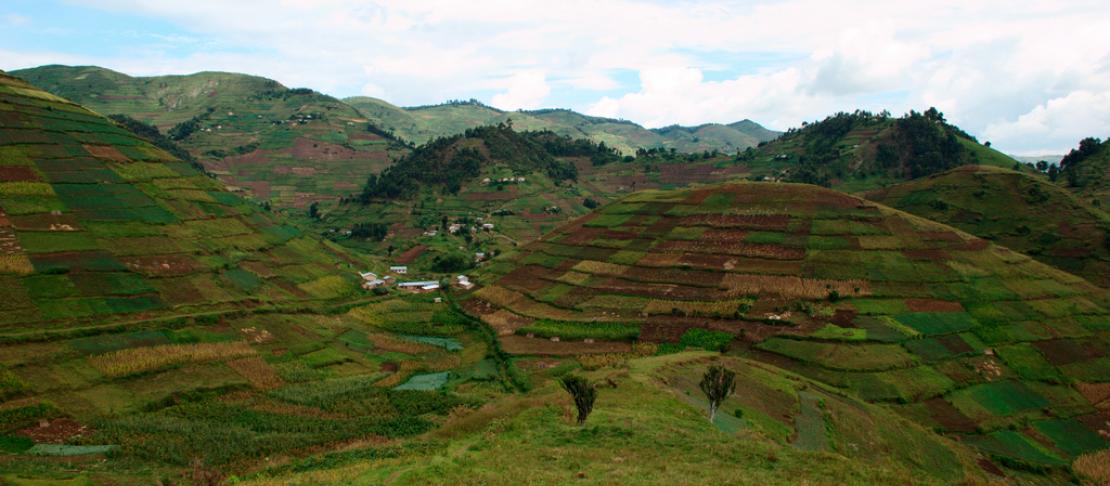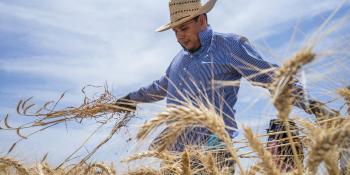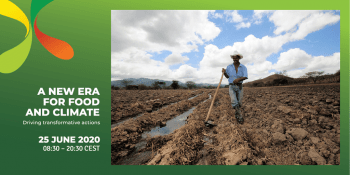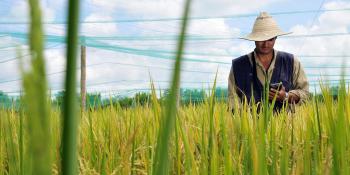Sustainable intensification: a tool in the sustainable food system toolbox

Tara Garnett reflects on her co-authored, recently released, article 'Sustainable Intensification in Agriculture: Premises and Policies'.
‘Sustainable intensification’ is one of those phrases regularly bandied about in discussions about agriculture. What does it actually mean?
The shorthand definition: ‘producing more food with less negative impact’ – seems hard to dislike. But when considering what it might mean in practice, all sorts of questions arise.
Does sustainable intensification imply a particular system or philosophy of agriculture? What about the ‘more food’ issue – how much more, what kind of food, produced where and for whom? How much weight does one attach to the ‘sustainable’ as opposed to the ‘intensification’ part? And what happens when ethical concerns such as animal welfare are added to the mix?
It’s not surprising that people have interpreted ‘sustainable intensification’ in different ways. Some have endorsed it because they see it as equivalent with a system of production that already exists; others reject it for exactly same reasons. And many still argue that sustainable intensification is quite simply oxymoronic – the two words in the phrase are inherently incompatible.
Finally, there are some of us who see it as an aspiration of what needs to be achieved – a goal rather than a particular state of play.
A new paper written by a group of us, and published recently in the journal Science seeks to add clarity to the discussions. Sustainable Intensification in Agriculture: Premises and Policies tries to do two things: first to lay out the logic on which it rests (why is it needed?); and second, to highlight other social, environmental, economic and ethical concerns that SI needs to engage with if it is to contribute to delivering a sustainable and food-secure system.
On the logic: we argue that there are four key premises.
First is that increases in food production are necessary but not sufficient. Many observers rightly point out that we already have enough food in the world to feed everyone – and yet people go hungry. They say that throwing more food at the issue is not going to solve what is at heart an economic and political problem: people are food insecure because of unbalanced power structures, because they cannot afford or access food or the necessary inputs for the means of production, because the shift towards increasingly resource intensive diets diverts essential resources from poor people, and because food losses and waste – the consequences of poverty on the one hand (poor infrastructure) and wealth (careless attitudes to food) on the other – mean that food produced goes uneaten. These problems contribute not only to food insecurity in all its forms but also to enormous environmental problems.
We agree. We emphasise that measures to sustainably intensify food production must be situated within a wider framework for action on food security. We need to see policy makers make concerted efforts to improve fairness and equity in the food system, to reduce food losses and waste and to moderate the growing demand for resource intensive foods such as meat and dairy products.
Nevertheless, we maintain that some more food will still be needed. With an anticipated population of 9-10 billion on the planet by 2050 it is simply too risky to assume that any one set of approaches will suffice. Inertia, time lags and ineptitudes in the policy making process make it inevitable that supply will need to increase. This doesn’t mean that we need to increase food by a certain specified amount, nor that more food needs to be produced everywhere: indeed in some areas the need to improve sustainability means that yield reductions will be needed.
But in regions such as Sub Saharan Africa there is a huge need to, and enormous potential for, closing the yield gap as this week’s Africa Agricultural Science Week will discuss. Yield increases can improve not only the supply of food, but also the livelihoods of smallholders –an essential part of the food security story.
The second premise is that if we are to produce more food, we need to do so on existing, not new, agricultural land. Why? Simply because the environmental costs of clearing new land are likely to be disastrous – CO2 release from deforestation and the ploughing up of grasslands, as well as incalculable biodiversity losses. The logical consequence of this – greater intensity of production - raises major, and justified, alarm bells given the environmental legacy of Green Revolution-style, input-heavy approaches to increasing yields through heavy reliance on fertilisers, pesticides and irrigation This is where it is essential to emphasise the ‘sustainable’ side of the SI phrase.
Sustainable intensification is emphatically not synonymous with business-as-usual. It is about farming in ways that emphasise resource efficiency and nutrient recycling, that harness the best of traditional and ‘modern’ knowledge, and that optimise the use of synthetic inputs where needed. Of course an alternative approach might argue that this “land sparing” approach is fundamentally misguided in that it posits an artificial separation between agriculture and nature.
Advocates of “land sharing” argue that the way forward, rather, is through more extensive, wildlife friendly forms of agriculture, which may necessitate greater use of land. It’s an important debate, one that has been discussed at length elsewhere (see here and here), including in relation to agroforestry. The short answer is that the ‘right’ approach depends on the context for implementation and the spatial scale one is looking at – more work here is certainly needed .
Finally, SI is not and must not be allied with any one particular agronomic philosophy, be this organic farming or particular approaches to plant breeding, such as GM. Ascertaining the most sustainable approach to maintaining or enhancing yields must depend on the land in question and the needs of local farmers.
These are the premises underlying the rationale for sustainable intensification. But they do not tell us anything about how food production per se fits in with other goals we have for the food system: what sort of food we should be producing, how it should support livelihood and developmental objectives, or how we should treat farm animals. These are huge and important questions and they will need to be answered in context specific ways.
Our paper makes it very clear, however, that measures to sustainably increase food production must be ‘sense checked’ against these wider goals. We may need to intensify food production but we need to make sure that we are intensifying the nutritional quality of that food too, perhaps through diversifying the range of crops grown, or by growing more nutritious varieties of those foods.
If food security is multifaceted, then we need to better understand the relationship between different systems of agricultural production and jobs and livelihoods opportunities both in rural and in urban areas. As to animal welfare, where certain approaches to intensification undermine their welfare, then we have to define the ethical boundary conditions beyond which, as a decent society, we will not go.
Clearly, there is a lot more work to do! Here at Oxford, the Food Climate Research Network will be working with the Future of Food Programme to develop further work in this area. We would welcome your thoughts.
For more information contact Tara Garnett: taragarnett(at)fcrn.org.uk
Read more about the article here.
A longer discussion paper on the subject is available here, based on the outcomes of a workshop organised by the Food Climate Research Network and the Oxford Martin Programme on the Future of Food.
Tara Garnett runs the Food Climate Research Network (FCRN) at the University of Oxford. The Future of Food Programme is an interdisciplinary programme of research and policy engagement concerning all aspects of the food system, based at the University of Oxford.



